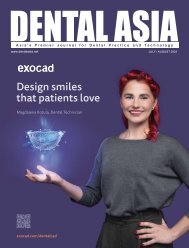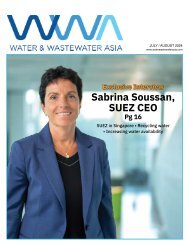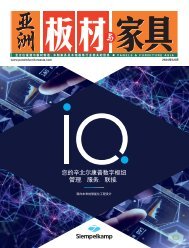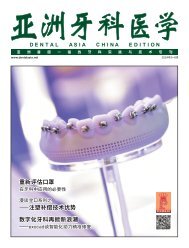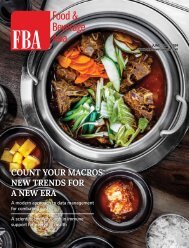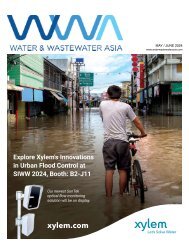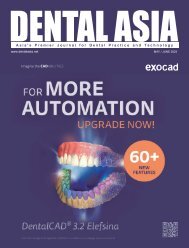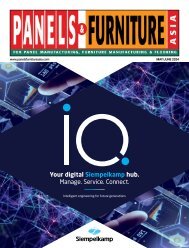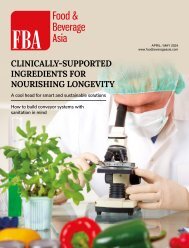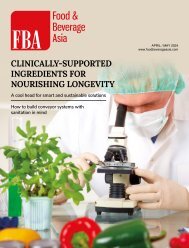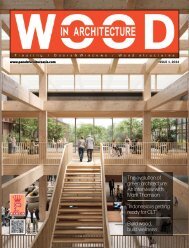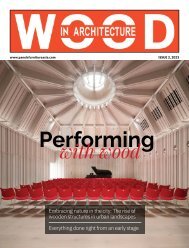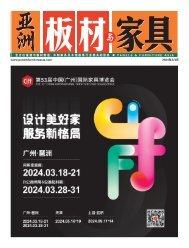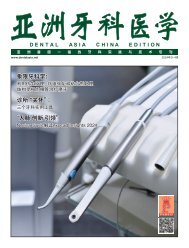Dental Asia May/June 2020
For more than two decades, Dental Asia is the premium journal in linking dental innovators and manufacturers to its rightful audience. We devote ourselves in showcasing the latest dental technology and share evidence-based clinical philosophies to serve as an educational platform to dental professionals. Our combined portfolio of print and digital media also allows us to reach a wider market and secure our position as the leading dental media in the Asia Pacific region while facilitating global interactions among our readers.
For more than two decades, Dental Asia is the premium journal in linking dental innovators
and manufacturers to its rightful audience. We devote ourselves in showcasing the latest dental technology and share evidence-based clinical philosophies to serve as an educational platform to dental professionals. Our combined portfolio of print and digital media also allows us to reach a wider market and secure our position as the leading dental media in the Asia Pacific region while facilitating global interactions among our readers.
You also want an ePaper? Increase the reach of your titles
YUMPU automatically turns print PDFs into web optimized ePapers that Google loves.
Under the Spotlight<br />
the clinician and cautions against trusting<br />
machine over a human.<br />
For instance, “If we ask the artificial<br />
intelligence in dentistry today, ‘I don’t know<br />
if I should extract this tooth and replace it<br />
with an implant or if I should keep it; perhaps<br />
it has a good prognosis.’<br />
“If a machine is educated by periodontists<br />
after reading thousands of x-rays, it may<br />
lean towards keeping the tooth since the<br />
periodontists have experience in salvaging<br />
it. But if the machine is conditioned by<br />
implantologists, given the same case, it may<br />
propose an extraction because from the<br />
experience of the implantologists, implant<br />
offers a good solution.”<br />
But with the human touch, a clinician can<br />
spot a nerve that the machine was not able<br />
to. And in this case, the clinician will have<br />
to make the decision that the implant has<br />
to be shorter or it would violate the nerve.<br />
“As long as we remember this, we will be<br />
safe,” he said.<br />
Cultivating future generations<br />
Going back to his job as head of the<br />
Department of Postgraduate Education<br />
& programme director of the Master in<br />
Oral Implantology, Dr Weigl stressed that<br />
continuing education is also the key to<br />
become a good dentist or surgeon.<br />
With science advancing at lightning speed,<br />
one of Dr. Weigl’s desires for his students is<br />
to ‘learn how to learn’. Learning should not<br />
stop after they have completed his course, in<br />
fact, he urged them to keep themselves up to<br />
date with the latest breakthroughs through<br />
reading scientific papers and attending<br />
congresses.<br />
Discernment is also important. “At any<br />
dental show, when they’re being shown new<br />
technology, they need to know when to say,<br />
‘This is good. It is honest and objective,’ or<br />
‘This is nonsense because they don’t have<br />
a good material method,’ or ‘This is just<br />
a selling show because they have a bad<br />
exclusive culture,’” he said.<br />
Bolstered by the positive feedback from his<br />
Chinese implantology students, Dr Weigl<br />
wants to reach out to other international<br />
students who are also affected by language<br />
barriers such as the Latin American<br />
implantologist. As a matter of fact, planning<br />
efforts are already currently underway.<br />
In addition, he would also like to train his<br />
students to think from the perspective of<br />
a ‘director’ and learn to take a holistic and<br />
multidisciplinary approach to their patients.<br />
Often, a specialist, no matter the field of<br />
study, will only see the problem from his<br />
own standpoint. A student who engages<br />
with a colleague outside of his own discipline<br />
may be able to avoid complications that he<br />
did not foresee. By working together as a<br />
team, there could be a viable solution or an<br />
alternative for a complex case that would not<br />
have been possible if they had worked alone.<br />
And this will be one of the focuses of his new<br />
post-graduate course in aesthetic dentistry.<br />
Besides the treatment and documentation of 20 patients in his home country, each student will also<br />
perform three implant treatments under the supervision of a tutor of Goethe University<br />
“When you see a patient getting better<br />
after two months, and how glad they are,<br />
it is tremendously rewarding,” Dr. Weigl<br />
commented. DA<br />
22<br />
DENTAL ASIA MAY / JUNE <strong>2020</strong>




